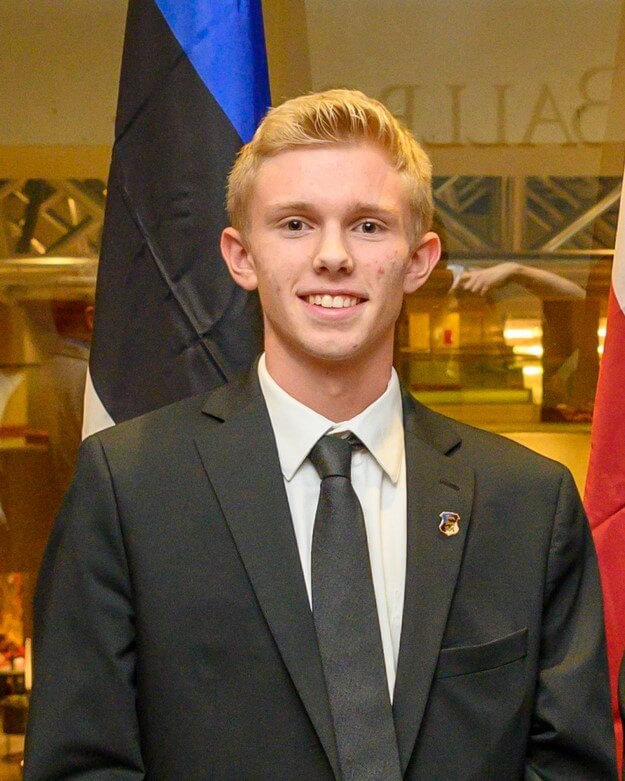
Alek Maasik. Photo: Ulla Vinkman
Alek Maasik (17) is an Estonian-American student in NY state, who is interested in international affairs. One of five Estonian American National Council scholarship awardees, Alek participated in Baltic Advocacy Day (Nov. 8), meeting with US state representatives on Capitol Hill, and attended the 13th JBANC Baltic Conference on Nov. 9th.
On Friday, November 8, I drove down to Washington DC for the 2nd annual Baltic Advocacy Day on Capitol Hill. I, along with three other Baltic-Americans advocated for the prosperity of the Baltic States with Senator Kirsten Gillibrand’s office and at Representative Sean Patrick Maloney’s office. My role was to spearhead talks on security affairs, U.S. military relationships with the Baltics, and the future of NATO. Madelena Miniats covered the environmental/energy and kleptocracy issues and Dzintars Dzilna asked Representative Maloney’s Deputy Chief of Staff, Ryan Lehmann what the congressman’s views on Baltic affairs are and asked about the possibility of the congressman getting a seat on the Baltic Caucus.
The legislative staffers from both congressperson’s offices were extremely helpful and were already very educated on Baltic Affairs and willing to be of assistance to us.
The most interesting part from Advocacy Day was my realization that American citizens can be very involved in their government and many do not even know it. The fact that I can go to Capitol Hill and request action in Congress regarding the Baltic States seemed unusual at first but after attending, I realized that I do have a voice in government.
The following day was the JBANC conference at the Marriott Wardman Park Hotel and I knew that I was in for a full day’s worth of world class speakers, informative panels, and a life-changing experience. At the beginning of the conference, the Ambassadors from each of the Baltic States gave their own speech and introduction. Each of them spoke on the importance of keeping the Baltic diaspora active within the community. I thought that Jonatan Vseviov’s (Estonian Ambassador to the U.S.) speech interested me the most. Mr. Vseviov stated that in order for the Baltics to live on, we need to do three things. The first was that “We need to exist.”
Existing is defined as keeping Baltic culture and teaching the languages. The second was that “We need to organize.” By attending an event such as the JBANC conference, this already a great sign that the Baltic community is coming together. Finally, the third is that “We need to be politically focused.” Baltics need to be lobbying on Capitol Hill and making sure that the issues in the Baltic States are brought to the attention of Congress.
After the Ambassadors spoke, the Prime Minister of Estonia, Jüri Ratas was introduced and talked about the importance of Baltic cooperation and how Estonia will hold a seat on the UN Security Council in 2020.
One of my favorite talks of the whole conference was Dr. Michael Carpenter’s speech. Dr. Carpenter’s theme for this speech was Russian deterrence and how “the United States cannot let Russia be Russia.” This statement was extremely powerful because Russia messes with governments internally, not solely by physical attacks. It is too dangerous to keep Russia off of the radar.
Once the preliminary talks were over, the conference moved on to the panels. Panel #1’s speaker list consisted of representatives from each of the Baltic American associations, the ALA, LAC, and EANC. The representatives reported on what they believe needs to be done about certain NATO issues and also on what the councils can do better to bring in more youth participation. Panel #2 was “Security, NATO, Threats, Baltic Neighborhood” and had prestigious panelists, including Eerik-Niiles Kross (Estonian Diplomat), JJ Green (National Security Correspondent for WTOP), and Paul Goble (Specialist on ethnic and religious issues in Eurasia). The main topic during this panel was Russia and how the United States can cooperate with the rest of the world in deterring Moscow.
Panel #3 focused on Baltic elections and the techniques the Baltic States use to keep elections fair and lawful. Each panelist worked either in journalism for a media outlet or communications as a government worker; which provided insight on both ends. Lastly, Panel #4 discussed media and disinformation and how disinformation affects communication and bias. One of the panelists was Brian Whitmore, Director of the Russia Program at CEPA, who explained that corruption and organized crime spearhead the beginnings of disinformation. Whitmore also explained the cycle as an “Ecosystem of Disinformation” which I found interesting.
After the JBANC conference, I attended the EANC gala which honored several distinguished figures in the community. There were many prestigious guests in attendance as well. Prime Minister Ratas gave a very empowering speech about Baltic cooperation and perseverance, as well as the future of the Baltics in global affairs. The most interesting part about my experience at the gala was my interaction with Representative John Shimkus of Illinois, who was being honored at the gala for his work serving as the co-chair of the House of Representatives Baltic caucus. Representative Shimkus and I discussed the future of the Baltic caucus and how he is optimistic on the future of the Baltic States. Representative Shimkus was extremely personable and generous with his time. At the end of our conversation, the congressman gave me his legislative assistant’s contact info in case I wanted to come back and visit.
The 2019 JBANC Conference and Advocacy Day was extremely eye-opening and informative. As a prospective International Relations major, this experience was invaluable and I received a first-hand lesson in civics. I thank the EANC and JBANC for the opportunity and I am pleased to say that I enjoyed every moment of it.
Alek Maasik
[email protected]












